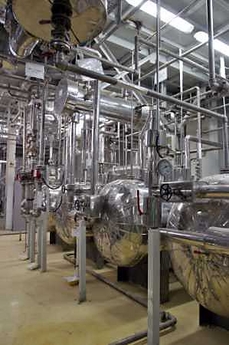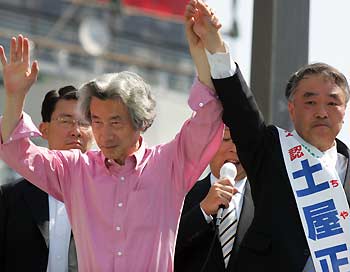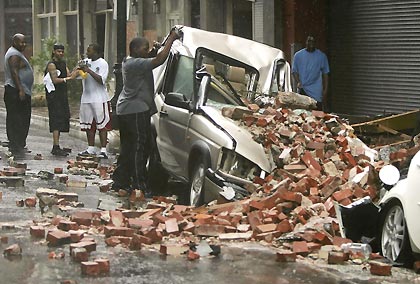|
Iran restarts uranium conversion facility
(Reuters)
Updated: 2005-08-08 21:10 Iran resumed uranium
conversion on Monday at its facility near Isfahan, a move EU officials have
warned will probably see its nuclear case sent to the U.N. Security Council for
possible sanctions, Reuters reported.

U.N. inspectors on
Monday prepared to oversee the removal of seals and resumption of work at
an Iranian atomic plant, a move likely to lead to Iran's case being sent
to the U.N. Security Council for possible sanctions. 'The agency
technicians have arrived at the uranium conversion facility to install
surveillance cameras,' a senior official told Reuters on condition of
anonymity. An inside view of a Uranium Conversion Facility producing unit
in Isfahan, 340km (211 miles) south of Tehran is shown in this March 30,
2005 file photo. [Reuters] |
"The uranium conversion facility in Isfahan has started its activities under
IAEA ( International Atomic Energy Agency) supervision," Mohammad Saeedi, deputy
head of Iran's Atomic Energy Organization, told reporters at the plant.
Iran agreed to suspend all nuclear fuel work last November as part of a deal
with the European Union while both sides explored a long-term arrangement for
Iran's nuclear program.
But Tehran has complained about the slow pace of the negotiations and on
Saturday rejected an EU proposal offering it economic and political incentives
to halt nuclear fuel work for good.
At the Isfahan plant two workers wearing white overalls, face masks and hard
hats lifted a barrel full of uranium yellow cake, opened its lid and fed it into
the processing line.
Other workers at the plant watched excitedly via closed circuit television
screens.
A nuclear scientist at the site, who declined to be named, said: "I am
excited, I didn't believe it until the last moment thinking this may not happen,
but now I am very happy."
Earlier a Reuters journalist, among a small group of local and foreign
reporters invited to visit the plant, said it was surrounded by dozens of
anti-aircraft batteries, patrolled by heavy security and surrounded by barbed
wire fences.
The plant is in a dry industrial area about 20 km (12.5 miles) southeast of
Isfahan.
Iran denies U.S. accusations that its nuclear program is a front for
bomb-making. It says it needs to develop nuclear power as an alternative energy
source to meet booming electricity demand and preserve its oil and gas reserves
for export.
It has offered to export the uranium hexafluoride produced at Isfahan to
allay Western concerns that it could be enriched into bomb-grade material. NEW
NUCLEAR CHIEF
The former state broadcasting head Ali Larijani, a conservative with close
ties to Supreme Leader Ayatollah Ali Khamenei, will replace Hassan Rohani as
Iran's chief nuclear negotiator, the official IRNA news agency reported on
Monday.
European diplomats had expressed concerns that pragmatic cleric Rohani, who
has led Iran's nuclear negotiations with the EU since 2003, may be replaced by a
more hardline official when President Mahmoud Ahmadinejad took office this
month, signaling a hardening of Iran's nuclear policy stance.
Britain, Germany and France have called an emergency meeting of the IAEA
Board of Governors for Tuesday to warn Iran not to resume work at Isfahan.
French Foreign Minister Philippe Douste-Blazy on Friday called on Iran to
"listen to reason" and said if Iran resumed its nuclear activities, "the
international community will surely bring the issue to the Security Council."
Iran on Saturday rejected a package of economic and political incentives
presented by the EU's big three countries aimed at persuading Tehran to scrap
nuclear fuel work for good.
Iranian officials said the EU proposal, which included offers of help to
develop civilian nuclear energy and in becoming a major transit route for
Central Asian oil, was unacceptable because it denied Iran the right to produce
its own nuclear fuel for power reactors.
However, Iran has so far been careful to stress that it is not restarting
work on the most sensitive element of the nuclear fuel cycle -- uranium
enrichment, a process that can be used to make reactor fuel or atomic warheads.
Iran's Foreign Ministry said on Sunday Tehran had nothing to fear from
referral of its case to the Security Council.
The IAEA has been investigating Iran's nuclear program for three years after
an exiled Iranian opposition group revealed the existence of undisclosed
facilities there.
While the IAEA has highlighted numerous failures by Iran to report
potentially weapons-related activities, it has found no "smoking gun" that would
confirm U.S. suspicions that it is secretly trying to make bombs.
|
 | | | Japanese PM launches general election campaign | | |  | | | Katrina slams US Gulf Coast, oil rigs adrift | | |  | | | Japan's 6 parties square off in TV debate | | |
|
| |
 |
|
 |
|
|
Today's
Top News |
|
|
|
Top World
News |
 |
|
 |
|
|
|
|
|
|


